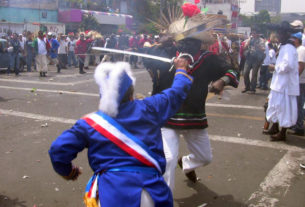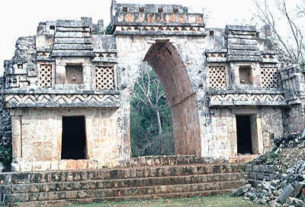Westwords
In my younger days, when I was relatively fearless or disturbingly dumb, I occasionally operated a motor vehicle on the mean streets of New York City, in broad daylight and at night, and once the wrong way on a one-way.
Without hesitation, I ventured onto Los Angeles freeways at rush hour, through interstate construction zones in Atlanta and into dark corners of Chicago, Cleveland, Philadelphia and Washington, D.C.
I’ve driven from Boston to Boise, in Denver, Dallas and Detroit city, along the scenic route from Madrid to Barcelona and from downtown Seoul to the stop sign at the south edge of the Korean demilitarized zone. Logged a few kilometers in the French Alps, dodged a couple of log trucks in British Columbia and mixed and matched with the locals, stirring up dust on the wrong side of Bahamian roads.
With Sarah as the almost flawless navigator, I have directed our trusty Volkswagen bug all around and about in Mexico — except Mexico City. Haven’t tried that yet. May not. Only there do I prefer to be a passenger. First choice would be safely inside a heavily armored tank, big enough to bust a bus in the beak.
For the most part, driving in Mexico is not as hazardous or stressful as warnings suggest. Highways range from fair to good to great. Toll roads require serious folding money. Defensive drivers live longer. Don’t assume others will stop at intersections. Limit or avoid night excursions.
Buy reputable Mexico insurance. Don’t let your gas gauge go low. Beware of federales learning to use radar guns. Respect warning signs, especially topes and dangerous curves. If a ball bounces onto the roadway, expect a boy to follow.
Driving in Mexico unlocks vistas you might otherwise miss. Simple as it sounds, some sights are on side roads where the bus doesn’t go — except on Tuesdays and Thursdays. When Joshua trees and wildflowers are blooming, stop and take pictures.
Some of our memorable adventures have involved pauses. Back in April, we were cruising toward Texas and Tennessee in our husky GMC Envoy Denali, loaded with snowbird luggage, gift blankets, wooden carvings, two paintings, picnic basket, ice chest and lots of stuff, when a flagman waved us into a zoological inspection station.
The main man and two top assistants approached tentatively, circled to the left and peered in the shaded windows to see what they could see.
Without cracking a smile, el capitán asked “Any cheek-ens back there? Any goats?”
Determined to maintain the mood, I responded “Not on today’s trip, señor, maybe mañana.”
That ended the charade. The laughter was hearty and genuine. There wasn’t enough spare space for a guinea pig.
At a military checkpoint, we were surrounded by young soldiers. One reviewed our documents. Another checked the license plate. Another practiced English, conducting small talk with Sarah.
One soldier stood off to the side, soft-tossing a baseball from one hand to the other. In my best sign language, I asked if he wanted my autograph. He responded enthusiastically, gave up his souvenir National Guard ball and provided a ball-point pen.
Old journalists, even famous sports editors, don’t get many such opportunities. I signed as if the ball was destined for the Hall of Fame.
As we drove away, the entire army gathered around the baseball — to see if that old man with white whiskers might be Babe Ruth.
Bits ‘n pieces: Mexico Mike Nelson of Sanborn insurance fame says driving is the only way to truly experience Mexico. Some of his best information about out-of-the-way places and little-known hideaways has come from gas-station attendants and waiters at highway restaurants.
It has been said that Mexico Mike coaxes visitors onto roads less traveled, to spots less obvious than beach resorts. Of course Mike believes in driving. Sanborn’s doesn’t sell flight insurance.
Long-distance transport trucks pulling two trailers are growing in numbers and maybe length. Big RV rigs are more likely to clog southbound roads in early December and northbound routes in early April.
A blinking left turn signal on the open highway may be an invitation to pass. It could also mean the driver in front of you is going to turn left or that the blinker is still blinking from a previous turn. Left-blinker signals coming from slow-moving truck drivers are considered reliable. You aren’t likely to get close enough to pass a bus.
The more I hear about Mexican police, the more I believe you will be treated fairly if involved in an accident. There are fewer stories of shakedowns and more reports of helping hands. The law is tough if injuries are involved. When trouble comes, it really helps to speak Spanish.
Like elsewhere in the world, most Mexico accidents are not accidents. They happen because of speeding, alcohol, carelessness, distractions and drivers taking wild and crazy risks. Some might argue that cell phones belong high on the danger list.


